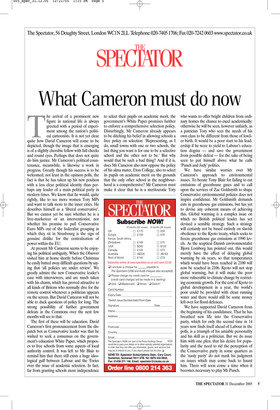What Cameron must do now
The arrival of a prominent new figure in national life is always greeted with a period of experiment among the nation’s political cartoonists. It is not yet clear quite how David Cameron will come to be depicted, though the image that is emerging is of a slightly cherubic fellow with full cheeks and round eyes. Perhaps that does not quite do him justice. Mr Cameron’s political countenance, meanwhile, is likewise a work in progress. Greatly though his success is to be welcomed, not least in the opinion polls, the fact is that he has taken up his new position with a less clear political identity than perhaps any leader of a main political party in modern times. We know that he would, quite rightly, like to see more women Tory MPs and want to talk more to the inner cities. He describes himself as a ‘liberal conservative’. But we cannot yet be sure whether he is a free-marketeer or an interventionist, nor whether his promise to pull Conservative Euro MPs out of the federalist grouping in which they sit in Strasbourg is the sign of genuine dislike for the centralisation of power within the EU.
At present Mr Cameron seems to be enjoying his political ambiguity. When the Observer visited him at home shortly before Christmas he easily batted away difficult questions by saying that ‘all policies are under review’. We greatly admire the new Conservative leader’s ease with interviewers, and are much taken with his charm, which has proved attractive to all kinds of Britons who normally dive for the remote control whenever a politician appears on the screen. But David Cameron will not be able to duck questions of policy for long. The strong possibility of further government defeats in the Commons over the next few months will see to that.
The first of these will be education. David Cameron’s first pronouncement from the dispatch box as Conservative leader was that he wished to seek a consensus on the government’s education White Paper, which proposes to free schools from some aspects of local authority control. It was left to Mr Blair to remind him that there still exists a huge ideological gulf between Labour and the Tories over the issue of academic selection. In fact, far from granting schools more independence to select their pupils on academic merit, the government’s White Paper promises further to enforce a comprehensive selection policy. Disturbingly, Mr Cameron already appears to be ditching his belief in allowing schools a free policy on selection: ‘Representing, as I do, small towns with one or two schools, the last thing you want is for one to be a selective school and the other not to be.’ But why would that be such a bad thing? And if it is, does Mr Cameron also now oppose the policy of his alma mater, Eton College, also to select its pupils on academic merit on the grounds that the only other school in the neighbourhood is a comprehensive? Mr Cameron must make it clear that he is a meritocratic Tory who wants to offer bright children from ordinary homes the chance to excel academically; otherwise he will be seen, however unfairly, as a patrician Tory who sees the needs of his own class to be different from those of lowlier birth. It would be a poor start to his leadership if he were to yield to Labour’s education dogma — and save the government from possible defeat — for the sake of being seen to put himself above what he calls ‘Punch and Judy’ politics.
We have similar worries over Mr Cameron’s approach to environmental issues. To berate Tony Blair for failing to cut emissions of greenhouse gases and to call upon the services of Zac Goldsmith to shape Conservative environmental policies does not inspire confidence. Mr Goldsmith demands cuts in greenhouse gas emissions, but has yet to devise any coherent means of achieving this. Global warming is a complex issue on which no British political leader has yet devised a sensible strategy. Such a strategy will certainly not be based entirely on slavish obedience to the Kyoto treaty, which seeks to freeze greenhouse gas emissions at 1990 levels. As the sceptical Danish environmentalist Bjorn Lomborg has pointed out, this would merely have the effect of delaying global warming by six years, so that temperatures which would have been reached in 2100 will now be reached in 2106. Kyoto will not stop global warming, but it will make the poor more vulnerable to climate change by restricting economic growth. For the cost of Kyoto to global development in a year, the world’s poor could be provided with clean running water and there would still be some money left over for flood defences.
We have supported David Cameron from the beginning of his candidature. That he has breathed new life into the Conservative party, which for only the second time in 14 years now finds itself ahead of Labour in the polls, is a triumph of his amiable personality and his skill as a politician. But we do issue him with one plea: that his desire for popularity and the need to rid the perception of the Conservative party in some quarters as the ‘nasty party’ do not mask his judgment on issues which may come back to haunt him. There will soon come a time when it becomes necessary to play Mr Punch.

















































 Previous page
Previous page